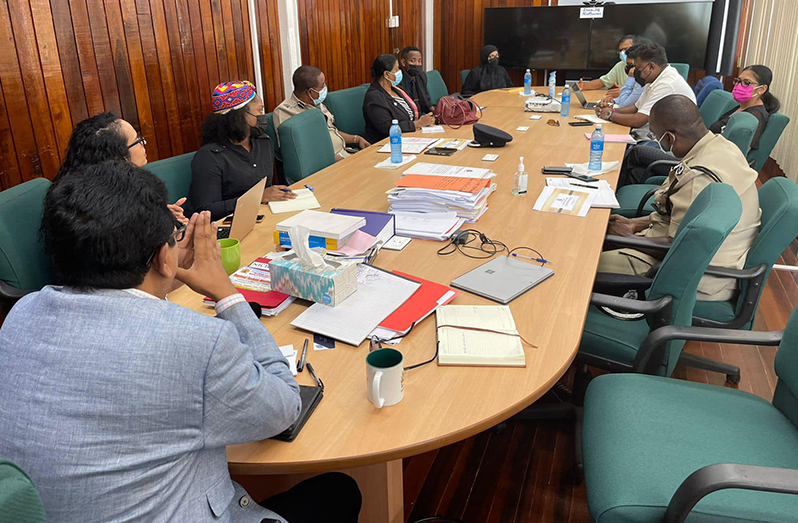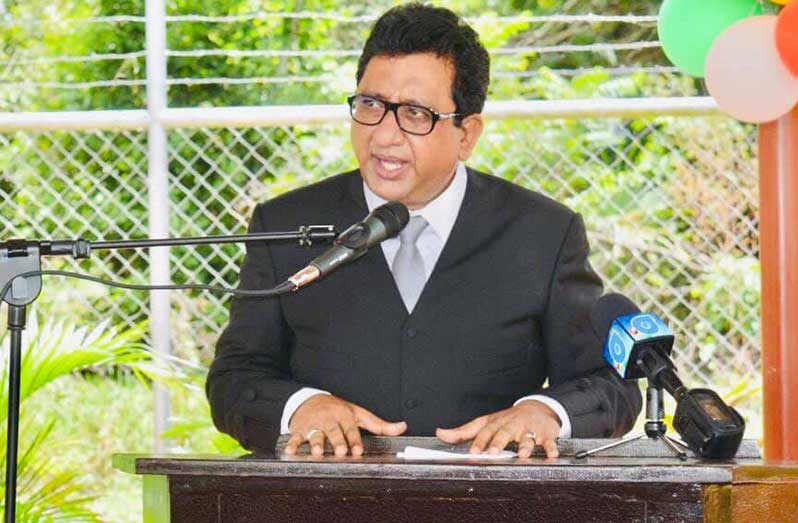— Drug Health Courts, Mental Health Courts on the table
TO address the issue of overcrowding in Guyana’s prisons, an offender’s mental health and drug use should be taken into consideration when a sentence is being imposed for crimes committed by persons while they are in a State of automatism.
This was discussed by Attorney-General and Minister of Legal Affairs, Anil Nandlall, S.C., and several key stakeholders during a meeting with representatives of the Support for the Criminal Justice System (SCJS) Programme on Thursday, to solicit views and recommendations on how the programme should proceed to produce the greatest possible impact.
Present at the meeting were Director of Public Prosecutions (DPP), Shalimar Ali- Hack S.C.; Commissioner of Police, Nigel Hoppie; Deputy Commissioner (Operations), Clifton Hicken; Head of the Psychiatry Guyana Public Health Corporation (GPHC), Dr. Bhiro Harry; Psychiatrist, Dr. Meena Rajkumar; Deputy Parliamentary Counsel, Joanne Bond and SCJS representatives.

The SCJS is funded by the Inter-American Development Bank (IDB) and is implemented by the Ministry of Legal Affairs. It seeks to help tackle prison overcrowding by reducing pre-trial detentions and increasing the use of alternative sentencing, among other measures.
On Wednesday, the SCJS reported that significant strides have been made in the attempt to overhaul and improve Guyana’s criminal justice system through revamping the country’s archaic legal infrastructure by implementing a gamut of initiatives aimed at modernising the sector and creating an environment conducive to the efficient and effective management of same.
During the discussions, several recommendations pertaining to addressing the prisons overcrowding by addressing the mental health concerns of offenders and the manner in which mental health and drug use are addressed by the penal system and the judiciary were made.
“There was unanimous agreement that Guyana’s archaic mental health legislation needed to be repealed and/ or amended and in conjunction with that, the required infrastructure and human resources to support the wide sweeping effect of the amendments,” a press statement from the Ministry of Legal Affairs said.
The implementation of Drug Health Courts and Mental Health Treatment Courts in every Magisterial District in Guyana which will exclusively manage accused persons who are afflicted with either ailment and have committed crimes, was discussed.
Noteworthy, Head of the Psychiatry Guyana Public Health Corporation (GPHC) Dr. Harry suggested that the current method for treating persons who are before the magistrates’ courts is ineffective and inefficient as those persons cannot receive the care they require.
As a result, there is expected to be a national proposal to completely overhaul Guyana’s treatment of persons suffering from mental health and drug addiction who are in Guyana’s Criminal Justice system.
Further, the Attorney-General recommended that proceeds from the programme be used to resource the police force with both equipment and personnel to type statements in criminal matters as well as to improve the system whereby witnesses are summoned in criminal trials.
The stakeholders also discussed the revision of legislations such as the Plea-Bargaining Act, Probation of Offenders Act and Narcotic Drugs and Psychotropic Substances (Control) Act with a view of removing from these legislations certain sections that will allow State agencies and offenders to create constructive relationships and interactions outside of the realm of custodial sentences which would be mutually beneficial to the public as well as the offenders.
The SCJS programme is divided into two components: the first seeks to reduce the use of pre-trial detention, especially for individuals accused of minor offences, by providing better legal assistance to individuals accused of non-violent offences, improve the prosecutors’ ability to handle cases according to the seriousness of the offence, strengthen the judiciary, and design and implement a restorative justice programme.
The second component seeks to increase the use of alternative sentencing by the criminal justice system in Guyana which includes strengthening the country’s legal drafting functions, modernising probation services and implementing a pilot project at the magistrate court level to apply alternatives to imprisonment to non-violent offenders.



.jpg)











